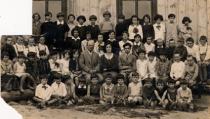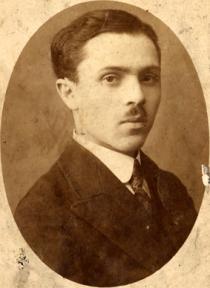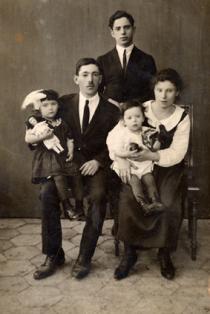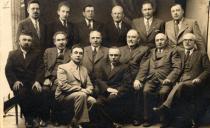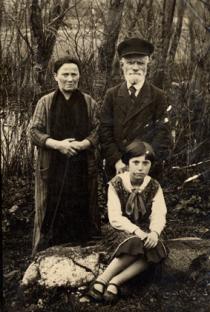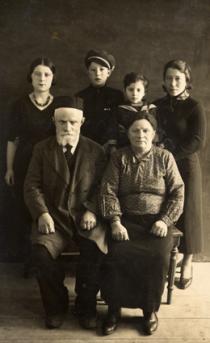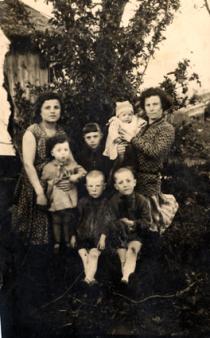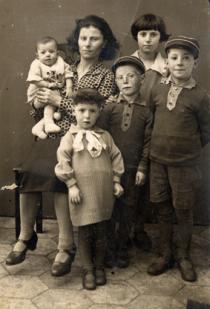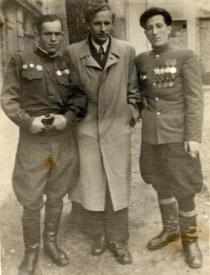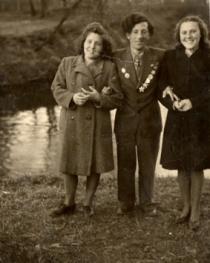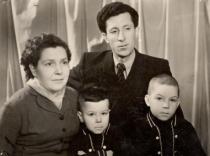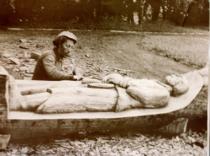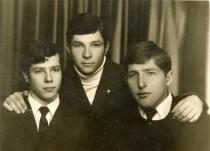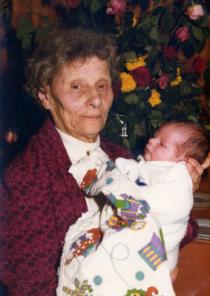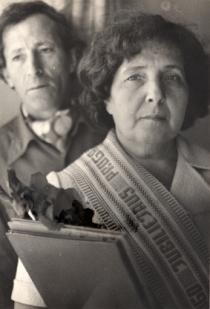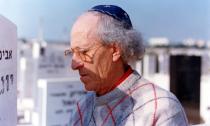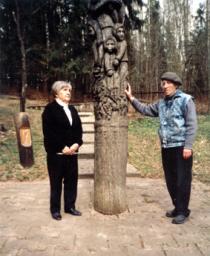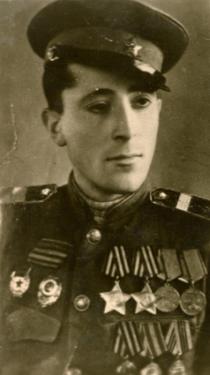
Yakov Bunke
Plunge
Lithuania
Interviewer: Zhanna Litinskaya
Date of interview: June 2006
I came in Lithuanian town Plunge [about 280 km from Vilnius] on sunny Sunday morning. I liked that small cozy town instantly – a small ancient room was steeply high from small bus station. Its park, old wooden houses, small stores looked amazingly groomed and pleasant. Yakov Bunke is living in a modern district, about 1.5 km from the center. He met me at the threshold of his apartment. I liked him at once. Yakov looks younger. He is of small height, athletic. He is wearing a large beret, which usually artists put on. Yakov’s study is strewn with unfinished and finished pieces and sketches. They are everywhere- on a small table, shelves, window sill. Here we start our conversation. Yakov is apparently a very sensitive person. At times it’s hard for him to pick the wording for these thoughts. Besides, it is hard for him to communicate in Russian. In some cases it is obvious that due to his age he could not remember some things. Yakov scarcely speaks of his life, military feats. There was one episode when he could not help crying- it’s when he was speaking about the end of war. When the interview was about to end, his sons came from Palanga. They treated me to lunch cooked by a hospitable Yakov’s wife Dalya. After lunch they took me on town excursion. We attended exhibition center, where children’s works were exhibited. On our way the town inhabitants greeted Yakov. When we attended Jewish museum, I was astound that it was founded only by one man Yakov Bunke. Our trio ended in a sorrowful place- where Plunge Jews were executed. Here I took a picture of Yakov Bunke and his wife Dalya by the monument to perished children.
My famlily background
I was born in Plunge. I have lived here all life long. My cognates lived in Plunge 400 years ago. Grandmother said that her parents, whose name I cannot recall, were rather well-off. They had their own bakery. Besides, great grandfather was also a rather good tailor. Their daughter- my grandmother Golda Kagan- also worked all her life. My grandfather Mende Ril was a trader and grandmother helped him. Both of them were born in Plunge in middle 1870s. Mother said that one of the things she remembered from childhood was when the parents processed flax, and it was their main business. She helped them standing on the stool lo be able to rich the processing machine. The clients who came over to her parents, treated her with sweets. Grandfather was also a tailor and a baker. Grandparents owned a small bakery. When I was a child I remember that grandmother sold grain and grandpa was a gabe in a local synagogue. He was almost blind. Grandparents had their own house. Even now it is in the heart of Plunge, where old houses are preserved.
Genach was the eldest son. He was born in 1890. Genach did not get married before being drafted in tsarist army during World War One. He was killed in action and grandfather could not abide by this loss.
Two mother’s brothers lived in Mexico when they were young. Both of them were older than mom. One of them was Shloime. I cannot recall another one’s name. In 1937 mother’s elder sister Sarah, born in 1894, married Sveit in Mexico and carried his name. Sarah had a large family. I only remember the names of 3 of her kids – Mausha, Fillip, Channa. Shloime and my second uncle also had big families. A lot of my relatives are currently living in Mexico. We have not kept in touch since mother’s death.
Another mother’s brother Nehamia Ril, whom we called Chema was several years younger than mother. He was a respectable man in Plunge. He was a goldsmith, he had his own workshop and a store. He was rather rich. His family- wife Channa and son Nisan had all they wanted. Chema was an activist, he was the chairman of the Jewish health council. Chema and his family did not manage to get evacuated. When the Great Patriotic War began 1, all of them were murdered by fascists with the remaining Jews in Plunge.
Ginda, born in 1910s was mother’s youngest sister. She married a Jew from Plunge out of big love and after wedding they went in a small town Saukville [about 200 km from Vilnius]. Ginda’s husband was Kaplan. They did not have children. She loved us and often came over. It happened so that in June 1941 grandparents Menda and Golda with my younger sister Mena went for a visit to her. The war began and they could not escape. All of them together with Saukville Jews were taken in Telsiai and shot with the local Jews and other Jews from adjacent towns. Thus, my grandparents, aunt Ginda and sister Mena perished.
My mother Taube Ril was born in Plunge in 1895. Mother finished elementary Jewish school and was rather literate- she knew written and spoken Yiddish, spoke Russian and Lithuanian. When she was single, she helped parents in their business, often replacing grandma in many house chores as grandmother was busy with sale. Nobody told me how my parents met. I think it was prearranged by shedchans, who organized almost all Jewish marriages. Their wedding took place 1920, in a chuppah in Plunge synagogue.
I did not know my agnates. Father’s parents died rather young having left orphans. Our last name Bunke has German roots and I assume that my ancestors were from Germany. My grandpa Iosif Bunke, born in 1860s was a cantor in the synagogue and grandmother Dina raised children. They lived in small town Silale, not far from Plunge. When grandparents died in the 1900s, their three kids left- the eldest, my father Leibl, younger brother Dovid and sister Nehama. Some distant relatives from Vilnius took the youngest Dovid. He was lucky as he turned out to be in a wealthy where Dovid was treated like own son. He was given a good education. He graduated from Kaunas university. He worked as a teacher, wrote articles and became a good journalist. He was friends with rabbi’s daughter Shilale. He fell in love with her and in early 1930s they got married. Dovid got an invitation to the USA, so he and his wife left for the USA, he taught there. Two of his kids were born there. We were bonded. Uncle helped us a lot during the postwar time. He died in 1979
I barely knew father’s sister Neham. She lived in Jurbarkas with her husband and two children. I saw her once or twice. I even do not remember her husband’s and children’s names. I know that her husband was a butcher and owned a butchery store. On the first day they were occupied as Jurbarkas bordered on Germany. They perished.
My father Leibl Bunke was born in Shilale in 1895. He was just couple of months older than mother. Father finished elementary school in Shilale, but he could not continue his education as he was an orphan. He was very gifted and he was self-taught. He was literate. Apart from Yiddish, father also knew Russian, Lithuanian. He composed verses and songs, and could sing them. When he was young, he was often invited to the weddings, where he sang songs composed by him. He was invited both for Jewish and Lithuanian weddings. Father loved Lithuania. He was a patriot. During the World War One, he was not drafted in the tsarist army as he was the eldest in the family. In 1919 during the civil war in Russia 2, Lithuania founded volunteers’ army to fight for the independence from Russia. Father joined the army. I struggled against Red army regiments, Poles and Germans and finally Lithuania got independence 3. Father took part in the battles and was even wounded on the cheek. He had the medals and orders. When Lithuania got independence, all volunteers got land plots. Father was given 8 hectares in Plunge. For a while he worked at the customs on the frontier with Russia, checking the cargoes and the people who were going to cross the border. Then he was a gendarme in Plunge. When he was in police, he met mother and in 1920 they got married. I kept their marriage certificate, issued by rabbi, but I gave it to the Jewish museum along with father’s awards obtained in struggle for independence.
Growing up
My parents never had their own house. After wedding they settled in the house of grandpa Mended and had lived here for several years. Here in 1921 my sister was born, who was named after my grandmother Dina. On 13 July 1923 I was born. I was named Iosif after paternal grandfather. There were five more children born after me. One of them- a boy, lived couple of days only. He even was not given a name. In 1925 Abram was born and in 1932 – Genya, in 1936 – Channa, and in 1938 – the youngest Mena.
I remember myself since the age of five. The years we spent in rented apartment and the years spend in grandma’s place were not engrossed on my memory. My first recollection from childhood goes back to 3 years. We lived on the street going up the hill. In winter peasants took the timber to the state authorities. I often sat by the window and looked them painfully climbing the hill. At times even horses fell. At that time I took a pencil and drew what I saw. Sister Dina, who was studying in the first grade of the Jewish school, took that picture to school. At that time there was an art exhibition for children at school. Sister took my picture and gave it out for hers. My picture won the first prize and sister had to confess that it was the picture of her younger brother. I was asked to come to school to pick up my award – an album and a set of pencils. Since that time I had been drawing anything I saw.
We lived very moderately. Father was not a gendarme. He received timber at the saw mill. He was a literate man, he calculated the volumes and made the settlements with the suppliers. Illiterate Jews and Lithuanians often asked him to write a letter or a claim. My father, who had not got any education, and learnt everything himself due to his talents, was also a very kind person and did not refuse anybody. Father’s voice was still good and he was invited to Jewish weddings. He was a mirthful man. He managed to compose the verses about the people who surrounded them and sang them. Besides, he took part in amateur Jewish theater in Plunge. Mother took care of children and modest household. Our apartment consisted of two rooms and a kitchen. Parents took bedroom, where younger children also slept. The elder ones stayed in a drawing room, where four or five of us slept on a large bed. The kitchen was poky. Russian stove 4, used for cooking and heating, took most of its part. The water was taken from the well in the yard. We had a small kitchen garden, where mother grew flowers and some herbs.
We often ran up to grandparents who lived in 4 or 5 houses from us on the same street. Grandmother was always busy. She sold grain which she took on the mill, located not far. Then she sold it at a higher price (couple of cents up from miller’s price) and made some money this way. Besides, she and grandpa baked very tasty challahs and pretzels, the latter were very popular with the neighbors and they were sold out very quickly. Almost every morning grandpa Mende brought us a bundle of freshly baked pretzels and we drank them with milk or cocoa. Grandpa also saw a little bit. He was an expert in all cloth making – he could make clothing for kids and he could make things from leather. With time his sight got worse and he stopped sewing. He had a rare gift. Now people would say that he was a psycho. People often asked him for help and he treated them with his methods. I remember one case which, I personally witnessed. A Lithuanian girl was brought from the village. She was swollen and the doctors said they could not do anything. She could not walk and her parent brought her in a cart and could barely carry her in the room. Grandpa Mende pour lemonade in a glass, took it and went in another room having told everybody to wait for him. I was curious and I started watching my grandpa from the window. I saw him whisper something over the glass, but I could not understand anything. Then he came back in the room and gave that lemonade to the lady to drink. In several days, happy parents of the lady came back home and brought presents –hens, butter, milk, cheese. Their daughter got well. Grandpa loved me and said that before his death he would tell me his secret. I did not say good-bye to him and even did not know about his perish until the war was over.
Grandparents were religious, but their adherence to Judaism was not bigotry. Grandmother and mother always wore a wig, only when they took it off, they put a scarf on. Grandpa always wore a kippah. He had a beard. He daily prayed at home and went to the synagogue.
At that time the population of town was 2 thousand people, more than a half were Jews. Estate of prince Oginstiy was the real adornment of the town. It is still there, though look deplorable. The prince did a lot for the town, in particular he stimulated trade and craft. He built 36 stores in the downtown and rented them to the Jews under long,-term lease agreement and in 24 years after the value of the store had been paid off, the title of ownership was transferred to the Jews. Almost all owners of the stores in Plunge were owned by Jews. There were merchants among them- Bisop, who was responsible for processing and sale of flax, Rolnik, Polyanksiy, Kurlianskiy, the owners of manufacture stores. There was also Jewish intelligentsia in Plunge : one lawyer, doctors. The mayor was also a Jew. Dovid Goldwasser held that post from 1919 till 1932. His deputy Girsh Mets was also a Jew. He had his own business- painting workshop. My uncle Nehemia Ril, the goldsmith was also prominent in town. There were a lot of craftsmen in the town- glazers, tailors, cobblers, watch menders, bakes etc.
Many of them were arrested by the Soviet regime 5 in 1941 and deported in 6 Siberia, having saved their lives that way. Those who stayed in town during the first days of occupation, were executed by fascist beasts. The fate of merchant Chatsi Ganzun was tragic. He sold horses. He purchased breedy horses, hired people who transferred them to Holland in a ship. Horses were in value there, and Ganzun came into money. He was the wealthiest in Plunge. He did not have children. His wife died. Life was hard on him, when he old and sick was exiled in Siberia in 1941 after all his property had been confiscated. A Lithuanian family which was also repressed went wit him. Lithuanians took a pity on him and helped him the way they could. They lived close by in Siberia. Chatsa promised Lithuanians the mountains of gold as he buried a treasure in his garden, gold and jewelry. He promised to buy two stores for the Lithuanians upon their return to motherland. In Siberia someone stole golden dentures of the old man. He could not eat anything and the Lithuanians did not want to feed him from spoon like a baby. Besides, they understood that they would have no riches or stores during the soviet regime. In fact, the wealthiest of Plunge died by hunger. During the soviet times his treasure had been found in his garden during underway construction. His treasure was given to the state.
All Plunge Jews were religious Jews, irrespective of the extent, they all observed traditions. Only one Jew Yankle Garb, who came of a very rich family, became a Catholic. All his relatives refused from him, and Garb married a Lithuanian. It was an outrageous case, discussed by perturbed inhabitants of Plunge for a long time.
There were several synagogues in town. There was a large and beautiful one, where all Jews came on holidays, and two more large synagogues, and 4 small ones. There was also undertakers’ bureau belonging to Chevr Kadish. Jews also were charitable, and grandpa Mende was the heart of the charity fund. Rich Jews paid money in that committee and then allocated them to poor families for the poor Jews to be able to mark Sabbath, holidays or just have something to eat. Poor brides were also helped to get married. Poor Jews were also buried on charity money. There were ‘official’ paupers in Plunge who asked for alms. For them not to be a disgrace for the Jews, they were distributed among the rich who took care of them. The owner of the rich house let some back with the necessary things in the house and the ‘attached’ poor man came over to get that bag and money to certain house. Nobody stole anything, and besides poor people were exempt from constant humiliation that way. That committee also took care of the collection money for Palestine. Young men and women were getting ready for immigration to Palestine and saved money for that. There was kibutz at school where I studied. They had a real communistic mode of life. They studied, learnt the craft, worked, put all money together and allocated expenditures. When the group was ready to immigrate, the left for Palestine and other wishers came in their place. We also had Beitar 7, and its leader Itsik Tsivia was exiled in Siberia. Nobody knows what happened to him. He most likely died there.
Our family was of the largest in Plunge. There was one poor man who had 11 kids, who were constantly hungry. We were neither poor nor rich. We were helped a lot by mother’s brother Nehemia. My elder sister Dina was raised by grandparents. She lived with them, and it helped to accommodate our large family in two rooms, besides it was easier from the standpoint of expenses.
Of course, Jewish traditions were also observed in our family. There were separate dishes for milk and meat. There was no pork. Hens were taken to shochet, whose shichta was in the yard of the synagogue. I often went there as per mother’s request.
Father did not go to the synagogue every Saturday, but he marked Sabbath at home for sure. We celebrated Sabbath in our rented apartment and grandparents in their place. On Sabbath mother cooked festive meals- chicken broth with noodles and gefilte fish. She also made deserts- imberlakh, all kinds of tsimes. I was never interested in the recipes. All my life I did not have a need in learning how to cook. Cholnt was the main Sabbath dish. It cooked in a large pot. The ingredients were meat, potatoes, beans. On Friday it was placed in a heated oven. I usually took it to grandmother, as their stove was always hot after challah baking. Grandmother gave us several fresh challahs, which was mandatory on Sabbath table. On Saturday I picked up our cholnt and we had it for lunch. On that day parent did not do anyting, though it was hard for my father to stand the loitering of that day.
We marked all Jewish holidays. Parents went to a nice and big synagogue and took us with them. I remember that I came in there for several times only. I mostly stayed in the yard with my pals. The biggest holiday – Pesach required beforehand preparation. Our apartment was scrubbed,and clean, dishes were koshered. We had special table dishes for his holiday, which was stored in the chest. Pots and pans were boiled in a huge pot in the yard. Matzah was brought from the synagogue. There was not a single bread crumb in the house on the first day of the holiday. I do not remember any special Pascal traditions. The first sedder was at home. Father reclined on the pillows at the head of the table and hid a piece of matzha under the pillow. One of us found it afterwards. Younger brothers asked four traditional questions about the holiday. On the second day we usually went to grandparents, when seder was stricter as grandpa was a deeply religious man.
On Rosh Hashanah grandpa carried out kaporez rite. He rotated rooster over our head and read a prayer. On the New Years day shofars were played and we had a very festive mood. On Yom Kippur all Jews of the town went to the river to wash off their sins accumulated within a year. We liked autumn holidays. Sukkah was set up in grandfather’s yard and we went there for lunch every day. There was a removable room, which we put on the holiday. Boys often pranked coming to the garden of one of the rich merchants. The roof of his sukkah was tied up to the fence with the ropes, and managed to untie those ropes and the roof fell on their heads. When father found out about it, he was very strict with me and I never did it again. Father never beat us. It was enough for him to have a strict and fair conversation with us.
Simchat Torah was one of the most mirthful. Everybody went to the synagogue, wherefrom torah was taken out and carried around the synagogue with songs and dances. A huge sponge cake was baked in the synagogue and everybody got a piece. We also had a lot of deserts at home. We drank a lot of wine on that holiday. In winter on Channukah the windows of all houses were twinkling with candles, one of which was lit on each evening of the holiday. I loved that holiday – presents, money from grandparents, uncles and aunts, tasty potato latkes and treilach, whirligig. I made nice whirligigs from wood, carved them and gave to my friends and relatives. On Purim we had all traditional things at home- a lot of hamantashen baked by mother for a large family of 9 people. Besides, some of them should be left for shelakhmones.
There was a melamed not far from house. Jewish boys went to his cheder. My father, being a rather modern man, decided not to give me in cheder, thinking that religious education was the matte of the past. Boys and I even mocked melamed as we did not like him for some reason. Now I am ashamed of it. I went to elementary Jewish school when I turned 6. Studies were in Yiddish and I did pretty well. I went here for 4 years and having finished it went to lyceum in Plunge. Here studies were in Ivrit and it was hard at first. All subjects were taught in Ivrit and even textbooks were in Ivrit. In couple of weeks I started understand a lot and after the first semester I was pretty good at Ivrit. I think in childhood things are better and quicker perceived. I joined Ashomer Ahatsir” 8, but did not stay there for long.
The owner of sawmill- Jew Salit, who resided in Riga, started spinning off his business for some reason. Father’s position was liquidated and he remained jobless. At that time it was next to impossible to find a good job in Plunge and in 1934 our family moved to resort maritime place Klaipeda. Father was offered a job in painting workshop at textile factory. The enterprise also belonged to Jew Israilevich. Father was an ordinary worker, was paid well, but still living in Klaipeda was more expensive. We started renting apartment against- two small rooms. Dina stayed in Plunge with grandparents. My sister Channa was born here.
There were a lot of Jews in prewar Klaipeda. There was a large beautiful synagogue not far from the house, where we lived. Parents went there on holidays. We marked Sabbath, observed kashrut the way it was in Plunge. Though, when father was at work, he had to eat all he could get in canteen. I do not remember if there were Jewish schools and lyceums in Klaipeda. Most like there weren’t as I continued my education in Lithuanian lyceum. I was enrolled in the 5th grade. There were 4 or 5 Jews in my class and we tried to stick together. I got along with the Lithuanians as well. Teacher did not treat Jewish students differently.
I turned 13 in Klaipeda. I got ready for bar mitzvah before hand. The teacher from synagogue prepared me. I learned how to put on tefillin, learn a big passage from torah. I will always remember it. After the rite we had a feast at home. My uncle Nehemia Ril gave me watch on that occasion. That watch was brought from Switzerland and special engraving was made.
I had a good voice. Rabbi, liked my singing, when he heard me in the synagogue. Shortly after my bar mitzvar a man from synagogue came to us. He started talking my parents into studying at heshiva in Telsia so that I could become a rabbi or shochet. It was good for both of my parents as they did not have to pay for my tuition and boarding. Father resisted a little bit, but I found it interesting. Besides, grandfather Mende wanted me to become a true religious man. He decided to take all expenses on Telsia. In 1937 I went to Telsiai to study in heshiva.I rented a room with two guys from Plunge, who were also studying inn heshiva. We had meals in Jewish families. In Telsiai community there was a plan for us to have meals in certain rich Jewish family on certain day of the week. I learnt Ivrit very well there, as well as torah. I was knowledge in Jewry both in religious and in amenities.
Parents lived in Klaipeda. In 1938 my younger sister Mena was born. On weekend mostly, I went to my grandparents in Plunge. On holidays, when I had several free days, I went to see my parents in Klaipeda. During Pesach in 1939 I also visited my parents. It was alerting time as Poland was occupied, 9, and Klaipeda which was nearby German town Konigsberg 10 in March 1939 was now under jurisdiction of fascist Germany. Fascists were openly walking around in the streets and the youth greeted them in a fascist way. Propaganda against Jews commenced, though I did not know any blatant cases of anti-Semitism. Our landlord, German, openly welcome fascists and her son became the member of organization Gitleryugend 11. Klaipeda was getting ready to meet Adolf Hitler who was going to pay a visit to the town. My father was perturbed and he could not help expressing his thoughts. In his conversation with the landlord he said that as during the civil war Lithuanian volunteers would get together for rebuffing Hitler. In spite of her fascist views, our landlord helped us out. Probably in a day after that conversation she whispered to my mom : ”Tell your husband to leave Klaipeda immediately. That evening on 19 April father left Klaipeda on food. We all took a cab and left after him. We reached Kretingi and waited for father there. Grandpa Mende sent a cart there to pick us up. I went in Telsiai in heshiva and the rest members of my family moved to grandfather Mende again. Soon we found out that Hitler came to Klaipeda and held a speech. Fortunately, all Jews left Klaipeda. Some of them settled in Plunge.
Another year passed and father had only odd jobs. Mostly grandpa and uncle Nehamia provided for the family. In June 1940 regular troops of Soviet Army 12 entered Lithuania. Uncle came to heshiva to take me. He understood that in soviet country rabbinical education was not only useless, but also dangerous.
I was apprenticed by a joiner Noel. At that time soviet regime nationalized large enterprises, but small workshop of the joiner was untouched. I had worked here for a year and became a good joiner. At any rate, the owner let me do my job independently. It was alarming time, we understood that the war was imminent. Fugitives from Poland came to our town and to other parts of Lithuania. Those were the Jews who escaped Nazi persecutions.
My sister Dina married one of those Polish Jews in spring 1941. Her husband Mushe Zinger was charming, kind and little bit odd. He was a student of Warsaw heshiva. He was poor and the newly weds lived in grandfather’s house with the rest of the family.
During the war
At night 21/22 June 1941 we were awoken by sound of the bombing. We ran to the cemetery, where all Jews got together hoping that the cemetery would not be bombed. But the bombs were released on graves. That terrible day was over and on the и 23rd of June we left the town. We put mother and Dina on the cart and we walked towards Latvian border. Unfortunately, grandparents and younger sister Mena were not with us. Couple of days before the war began, they went to Skautville to see the aunt. Mother cried, asked father to wait for them, but he understood that it was impossible as we would be in occupation. Though, all of us hoped that the war would be over quickly, believed the soviet propaganda that victorious Red Army would crash fascists in two or three weeks. We thought we would be back soon.
In several day the throng of fugitives, which we joined, reached Zagare – the border with Latvia. Here we were detained. They clarified some issues on the phone and finally let us through. We spend 2-3 nights in some school in Riga. Then we headed farther, to Russian town Velikiye Luki. It was a very miserable way- bombings took lives of fugitives and saw death for the first time in my life.
I do not remember how we parted with Dina’s family. At any rate, we were in Velikiye Luki without them. There was a train with fugitives at the train station. We got on locomotive car and headed towards the East. We had been on the road for 2 months due to the long stops when we had to let military trains go first. There was boiled water in the train, and at the stations we were given small slice of bread and a plate of soup. Some evacuees from Russia, who had more time to pack, took some food with them. My younger siblings came up to them and asked them for food. They gave them bread – people shared the last thing they had. Train was being bombed on our way. People died and the survivors did not even have a chance to bury the dead.
We were taken in big city Novosibirsk [Russia about 3000 km to the North East from Russia] and housed in some basement. Not only our family was there. There were about 20 people. We got some products went in the canteen. In about two weeks, when we managed to get used to that life style, some rural people came over and suggested that we should go with them. We went to kolkhoz 13 named after Voroshylov. We were given a warm welcome. We settled in a school building. Most of the villagers here were people who were exiled after revolution 14 – well-off peasants, kulaks 15. The war had not reached that remote place yet. There were poultry and cattle there. We were given eggs, milk. It was the first time when we were full.
Then we were housed in with some local family. There was a bathhouse in every yard. So we settled in the warm bathhouse. Father went to work as a shepherd. There was a special store for the evacuees, where people could get things by food cards 16. We had a very good living here. Here I got a new passport in place of the one I left in Lithuania. By mistake they put another name– Yakov, and it remained for ever in my documents. My kin and friends always called me Iosif- the given to me at birth.
In December 1941 16 Lithuanian division 17 was founded and all citizens of Lithuania, who reached draftee age, were sent in the lines. Father and I got notifications and on 22 February 1942 we were in the lines. Abram, who was younger than me, was drafted a year later. We were sent in Balakhna, where division was being formed. We went there independently. The winter was cold and it was a real ordeal. We were on trainings in Balakhna for a year. I became a gunman, and my father a marksman. In Balakhna paper “For the Motherland’ was issued in our division. We read there that all the Jews, who stayed on the territory occupied by fascists were executed or exhausted in ghetto. We had almost no doubt that our kin who stayed in Lithuania, perished, father and I were eager to fight in battles seeking a revenge on the fascist. We often wrote letters to mother and brother Adam and got answers from them. When we had free time, father and I remembered happy prewar years- how petty our adversities and troubles seem now. Soon we found sister Dina. She and her husband left for Kazakhstan, where they hoped to find abundance in warm climate. They starved there and sweet and kind Meishe, died by hunger there as he was totally unadapt.
We were in the lines in February 1943 and were in one of the fiercest fronts –Kursk vicinity 18. Father served in 156 rifle battalion and I was in the same battalion, though in gun division. The battle in the vicinity of Alexeyevka began on 23 February 1943. It was very cold, and we had wet coats. We did not have a good provision. That is why there were a lot of wounded and killed. It was a fierce battle. There was an open white field covered with snow. There was no place to hide. Germans were shooting everywhere. I hit behind the body of the dead soldier, but I was hit with blasted mine. On 1 March 1943 I was severely wounded. My commander said that I was lucky as he did not know what would happen to the rest in that hard battle. I was sent in the hospital. Father saw me off to the medical battalion and we parted like men without tears. Father promised to calm mother down as she was worried for me. It was the last time I saw dad.
I was sent in Kazan hospital. they removed a bullet. One of my nerves was caught and my hand was immovable. Having serious injury I was sent in the rear to Zlatoust. In spring 1943 I accidentally met my pal from Plunge – Tsingler, who was also in the lines. He also was wounded and sent here for treatment. He said that my father died and even gave me the details. Tsingler was an eye witness of the battle on the 8th of March. He saw my father being blown up. I vaguely remember my reaction to this news. There was so much grief around that I took my father’s death as inevitable. Mother got the notification before I found out the news. She did not want to write to me about it for me to be even more hurt.
I went through the treatment- wax and mud applications. When I got well, I was to undergo medical consultation. My friend Tsingler decided to bribe the commission for me to be discharged from the army. He had Swiss watch and he decided to sacrifice it. Most likely they did not listen to him and I was sent to rehabilitation center in Chelaybinsk for 20 days. After that I had to go to the front once again. Usually all Lithuanian citizens were sent back to the Lithuanian division. It happened in another way with me.
Representatives of Cossacks corps 19 under general Dovater command came in Chelyabinsk to replenish their troops from the rehabilitation center. I was offered to join them. The matter is that my height and weight parameters suited them well. They did not care that I could ride a horse. They said I would be trained quickly. I was the only Jew among Cossacks. they assigned me in horsed reconnaissance. Since I knew Yiddish I could understand German. I turned out to be in the First Byelorussian Front. It was the end of 1943 and Soviet army was retreating. I started from Gomel and crossed Poland, Germany. I even met Americans on Elba.
We liberated Gomel, Mozer, Kalinkovichi, entered state border, reached Warsaw. I took part in liberation of Polish capital. When we entered Warsaw, German yunkers occupied the premises where they were studying, and they did not want to give up. We had been attacking the building for 3 days until the shooting ceased. When we came in the building, none of them was alive- 32 adolescents were dead. Most likely most of them committed suicide. I got awarded for liberation of Warsaw. I had a lot of awards. By the end of war I had two Great Patriotic War Orders of the First Class.
I got my first order under the following circumstances. We were in Poland. The four sergeants were told to reconnoiter a small town. We left horses with a peasant and hurried out. On our way we saw some dragging people. First, we thought that those were our guys, but then we understood that it was a group of crashed Germans. There was a skirmish and as a result we took a captive, who turned out to be very talkative and provided a lot of useful information. I and another comrade got the orders and the rest were also awarded. I got my second order for intelligence operation during forced crossing of Visla.
While we were on the territory of Poland, we were told that Poles were our brothers and we should treat them as brothers. On the German territory there were no talks of fraternity, as Germans were our enemies and any even slipshod behavior was implicitly encouraged. In Poland, it was hard to fight as Poles treated soviet soldiers in a bad way thinking them to be occupants. We did not leave quarters by one. There were cases, when local citizens poisoned food and our soldiers died. The soldiers of our regiment were saved by miracle as they managed not to drink poisoned vodka.
Our militaries behaved differently on the occupied territories. Some of them were indecent. They made orgies in deserted apartments, crushed furniture, broke pictures, I saw soldiers sitting on the antique grand piano. Many were involved in plundering and raping. I also witnessed one blatant act. There were some soldiers in our part who were released from prison for being volunteers to go in the front to wash off the disgrace of their crime by good faith military service. One of them had been imprisoned half of his life. It happened so that our reconnaissance group went on assignment and I stayed with that guy in a village where we were staying. Suddenly I saw him pointing a gun at an old feeble couple. He said that they killed a lot of our people and remained unscathed. He was going to kill them. I took him by hand and said that he had no right to shoot at innocent people. I managed to cool him off, so he put down weapon and left. Grateful old people, with whom I spoke in German later, said that they did not understand what they guy was telling them, all they knew that they were on the brink of death. They gave me an ancient pipe.
When we crossed the territories, occupied by fascists, we met people who were released from ghetto. One of those camps was in Polish town Pydgocz. I met three girls who had just been set free from the camp. One of them was from Klaipeda, the other two from Tula. They were still wearing striped camp clothes and had no place to stay. We found one of the deserted apartments. At that time there were a lot of vacated apartments full of clothes and foods. So, we housed the ladies in one of them. We spent couple of evenings with them. I heard about such atrocities! I could not imagine that people could survive in such conditions! I especially enjoyed talking with the lady from Klaipeda. When talking to the person from my country, we as if came back in our childhood, in our parents’ house, to the peaceful times, when everybody was alive. Then we parted, and I do not know what happened with her.
In early March 1945 I was wounded the second time at Frankfurt upon Oder. It was a light injury. I was sent in a hospital in Poland, not far from Lodz. I stayed in the hospital for less than a month and in middle April I was supposed to go in my unit. I got the letter from the unit with the order to get two horses in Lodz. They provided a special train car and I came back in the unit. My fellow-in-arms -Sergey Boltashvili with whom we shared everything, was the most happy to see me. He was worried that I would be transferred to a different unit because of my wound.
Our unit took part in the meeting with American militaries at Elba. Though, I personally was not invited for a meeting, our officers met with the Americans. The very event was awesome. When Berlin was being captured, our military unit was responsible for a certain part of the front- a small hamlet Berlit- the outskirts of Berlin. We had been fighting there since 2 May.
On 9 May during our respite we heard the signal of alarm. We thought that Germans had broken through our defense line. We lined up with the horses and started reporting. My report started as follows: I Old Bunke (old was the nickname of my mare). After greeting my commander made a short pause and said: ‘brothers, the war is over!’ Even now I am crying when I go back to this moment. We were rejoicing and crying at a time as I remembered about my brother Abram, who perished almost at the end of war during the capture of Konigsberg, my old grandparents, sister and other relatives who perished during the occupation.
After the war
I served honestly. I was offered to join komsomol 21 on a number of occasions. Before the battle many guys wrote the applications to join the party and went in the battle with the words «For motherland, for Stalin». I was not willing to die for Stalin, but to take a revenge on fascist beasts that killed my relatives to fulfill the request of my father. My military deeds were highly appreciated. I have numerous awards- two Grain Patriotic War Orders, Red Banner Order 22, medals for liberation of Warsaw and other cities, medal for capture of Berlin etc. I have the letter of gratitude from Stalin for capture of German town Oltsin.
The war is over, but I still had to serve in occupied troops. I was sent to the North of Germany in a small town on the border with Sweden, on Baltic Sea. I do not remember the name of that town. I finished war in the rank of senior sergeant and was assigned the commandant of that small town irrespective of my low rank. The work was not cumbersome. My duty was to keep the order in the city, though there was an apple-pie order there anyway. After war Germans were frightened as they felt guilty. Thus, there were hardly any incidents. There was a peaceful, but very poor living. People got back to normal, started rebuilding the destroyed. I had a luxurious living. I lived with the German who was married to a Lithuanian. He had a good game preserve and a house, where we were living. It was intelligentsia, who had nothing to do with the atrocity of the fascists. We spent evenings together. I told the hosts about my military life, about crimes of Hitler’ s troops. They were shocked. On Fridays the representatives of local intelligentsia came to see us- one lady, who was a niece of general Paulus [editor’s note: General Paulus is a famous general of Hitler’s army, who lost the crucial battle in the vicinity of Stalingrad and surrendered to soviet troops], played the grand piano.
In April 1947 I was demobilized from army and went to motherland, Plunge. Mother and sisters came back from evacuation. I moved in their room. Mother was so happy that I was alive, and the only survivor in the family came back full of awards. We had a long talk, I was told how Plunge Jews died. Before fascists came in town, Lithuanian nationalists brought all Jews in the synagogue – even all children and kids. They kept them there for two weeks without water and food. People ran amuck, died, and there was nobody to bury them. Rabi Veksler was told to dig a pit in the yard, where they threw torah scrolls, pushed rabbi and burnt him with the books. Photographer Berkovich was told to take care of the fire and then pushed him there as well. I do not know how our kin died, but they had to go through ordeal. In our districts Jews were executed in 10 places - 2221 people are lying there.
We had to adapt to living in peace. Since childhood I dreamt to become an artist. I even drew pictures anywhere I could, but I had to work to help out mother. I was send to work as an instructor of rifle department of Dosaaf [Volunteer society of assistance of Army and the Front]. I did not work there for a long time, less than a year. Then I found job in some company as a joiner. I made complex furniture, then I became a foreman and ran production. I had a chance to be creative in my work- I made carving and inlay. Since 1962 I started taking part in the competitions and was conferred with the title- people’s artist. In 1983 I retired. I devoted myself to the art since then.
My private life turned out to be pretty good. I often went to ispolkom 23 on various matters and I met secretary the secretary there- a young Lithuanian lady –Dalya Baitkute. Dalya was born in Plunge in 1925 in the family of a launder lady. In her childhood she often delivered washed clothes to Jewish houses and she made friends with Jewish girls. She even spoke Yiddish. During the occupation, Dalya was in Plunge and saw what wrongdoings fascists did. Dalya was divorced and raised a son born in 1947. In 1949 we met and fell in love with each other. Our parents – my mother and Dalya’s parents were at first against mixed marriage, but soon they agreed and –in 1950 I married Dalya. My sisters were married off before me, and Dalya with me lived in mother’s place. Having high military awards, I was given a small apartment. When we had kids, we got a good three-room one. We are still living in it.
I adopted Dalya’s son Virgilius and he treats me like his own father, though he knows that I am not his natural father. In 1952 our elder son Evgeniy was born. Then in 1953 – Leonid. He named him Leibl after my dad. My uncle Dovid always helped us a lot. He sent us parcels from the USA. We had a modest living. We had neither dacha nor car. My sons went to school, when they had to choose which nationality should be put in their passport, even my mother said that they should put Lithuanian to be able to enter the institute without any hindrance. Though, at the age of 16 they got passports with Lithuanian nationality, they identify themselves as Jew as they love me and respect Jewish history.
The eldest Virgilius became a seaman. He has been in that occupation for 12 years and now he is a businessman. Vergilius owns a printing house in Klaipeda, where he is living with his wife Mika.
Having finished school Evgeniy entered Vilnius university, the journalist department and graduated from it. He married Lithuanian Danute, who having graduated medical got a mandatory job assignment in resort town Lavylai. Evgeniy is living there with his wife. Evgeniy works as a journalist. His son Darius is also a journalist. He is living in Kaunas with his family. Evgeniy’s daughter Marina is working and living in Vilnius.
My younger son Leonid finished polytechnic institute. He is an engineer. He is living and working in Palanga. His wife Roma is also Lithuanian. Leonid’s daughter Sandra finished economy department in Vilnius university, left for the USA, married there and became an American citizen. Leonid’s younger daughter Evelina recently obtained masters degree in architecture. My youngest grandson- Leonid’s son is named after my uncle Dovid. The boy goes to secondary and to music school. he has a great artistic talent. His paintings were selected for exhibition in Sweden. He is going there shortly. He takes first prizes at the exhibitions of children’s art.
Our family was always very friendly. When my sisters got married and bore children, they started communicating with my sons. We have always been one family. After war Dina married Kurdish Jew Amvilov, who happened to be in Plunge after war. Dina bore a daughter, and named her Golda after grandmother. Dina’s younger daughter is Bella. Genya married Lev Gornstein and a bore two daughter one-Mena, named after our perished sister, and the second daughter- Aida. My sister Channa also married a guy from Vilnius, Aronchik. In Vilnius she bore daughter Luba and in Israel Channa bore Aviva. My mother helped all of us to raise grandchildren, she went to Vilnius to see her daughter. She was a true grandmother. When repatriation of Jews to Israel commenced, mother and her granddaughter Golda were one of the first to leave in 1972. Dina with her husband and younger daughter wanted to go together, but they were not given the visa. The family was separated for 8 years as Dina and her husband were refused in permit. Then everybody left- Dina’s Channa’s and Genyas’ family. Channa and Genya are still alive. Dina died. All their children are living in Israel. Only Mena left for the USA and became a superior opera singer there.
When my sisters were leaving, I also had a chance to leave, but my wife Dalya always supposed in my decisions. I had only one intention- dedicate my life to perpetuation of the Plunge Jews, who perished during the war. I made sketches a long time ago and started my work. I wanted to show the tragedy of Lithuanian Jews in Lithuanian art. I went to different organizations, ispolkom and my Dalya helped me in everything. First, I managed to get Jewish cemetery restored. It was dilapidated, and so people even took the stones from it to use in constructions. I was given a car and I drove around the whole district looking for the stolen stones. I managed to find 85 tombstones and revived the old cemetery. Now it looks well-groomed. Jews from Israel, America come there and order kaddish and pray.
In 1956 there were 130 Jews in Plunge. Now, I am the only one. I understand that I am the last Jew in this small town with an old Jewish history. The reason why I have not left for Israel is to tell the local inhabitants about the history of their town and perpetuate the memory of my tribesmen here. I am thankful to people for tolerance and understanding. People treat me very well. I am also dealing with Lithuanian history. I do some works in Lithuanian theme as per request of the authorities. I am a judge at children’s art exhibition. I help in decoration of all events. This year their nominated me for title -the honorable citizen of Plunge.
I got the permit to create memorials of Holocaust victims, the biggest one is in Plunge. I made all sculptures myself. There are several wooden sculptures, one of them is dedicated to perished children, the other one is dedicated to my grandparents. I told the Lithuanian school about Jewish tragedy, and now Lithuanian kids regularly take care of the memorial, and keep it clean. I also installed memorable insignia in other execution places. I worked mostly on Jewish theme, made characteristic images of Jewish craftsmen, workers, characters of Shalom Aleichem 24.
Another matter of my life is creation of the museum of Jewish history in Plunge. I obtained the right to found the museum, got the premises. We did it with the help of my wife Dalya, my sons and friends. All kinds of people sent me exhibits of Jewish utensils. I looked for historic pictures. Now the museum is acting. Though, in postwar times we did not stick to Jewish traditions, my children grew up Jewish, even Lithuanian Vergilius.
In 1986 my fellow in arms Sergey Boltashvili found me and we went to Georgia. We wrote to each other for a long time, but only on the eve of breakup of the soviet union [1991] we lost the connection. In 1989 I went to see my relatives in Georgia. Aunt Sarah, mother’s sister was still alive. I met my numerous cousins- children of Sarah and mother’s brothers.
In 1996 Dalya was invited in Israel. There was my personal exhibition there. We had stayed there for 3 months. Unfortunately, mother and Dina were no longer alive. Mom died in 1989 and Dina one year before we came. We were on the cemetery, attended the graves. Sisters Channa and Genya gave us a warm welcome and I felt the warmth of our large family, which lasted a long time.
I have a fully fledged life. My works are in Plunge museum and in other organizations. Now we are the members of Klaipeda Jewish community. Dalya and I go there on Jewish holidays. Recently we marked pesach. Soon there will be Victory day. In spite of the fact that it is not customary to mark this holiday in independent Lithuania, I take this holiday as one of the most important in my life. On that day, we the veterans (and there are a few of us left) put our awards on and go to cemetery. There – we Russians, Lithuanians, Jews understanding those who fought with us and died. We remember the years of war. Fortunately, there are no fascist parties in our small town, and both middle age people and the youth treat us with respect. My true friend and wife Dalya is everywhere with me.
GLOSSARY:
